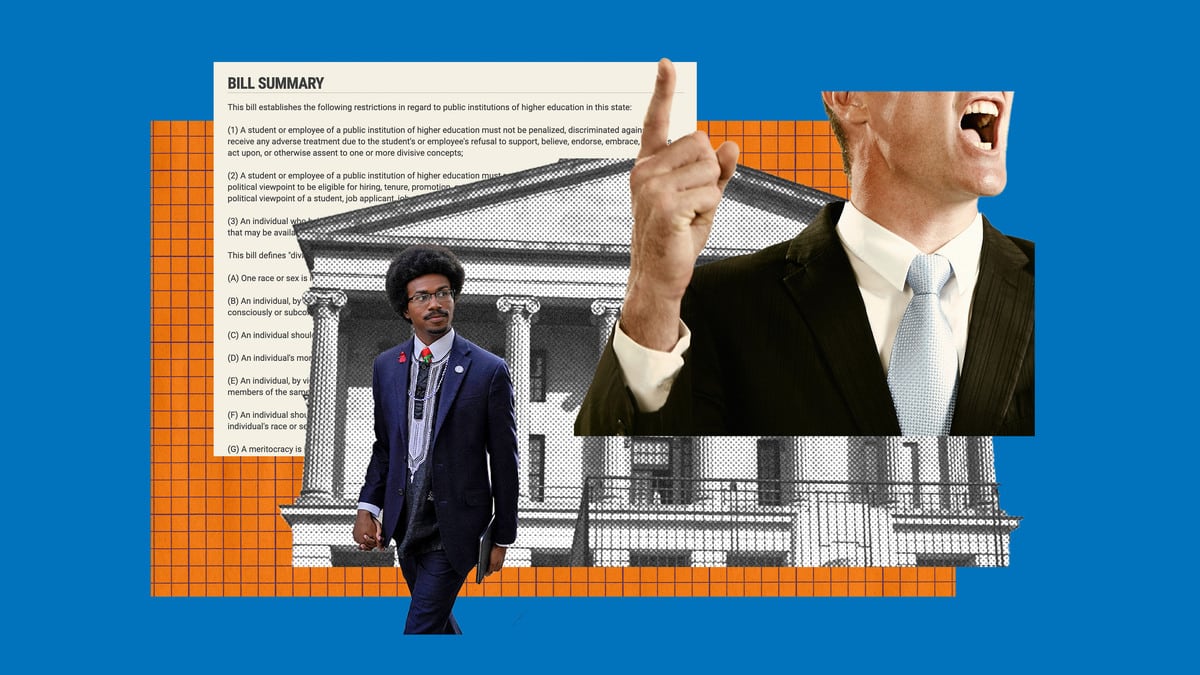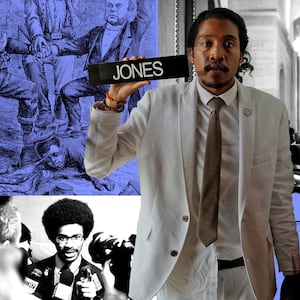The bust of Nathan Bedford Forrest—a Confederate general and first Grand dragon of the Ku Klux Klan—was finally removed from the Tennessee capitol two years ago. But his spirit was still present in an edited recording of the state’s GOP House members meeting on April 10, three days after they expelled two Black representatives for violating “decorum.”
Where Forrest once talked of the South and the North, GOP Rep. Scott Cepicky speaks of the Right and the Left in the recording, which was posted by the progressive news site Tennessee Holler. (The Tennessean confirmed the audio came from a closed caucus meeting.)
“If you don’t believe we’re at war for our republic, with all love and respect to you, you need a different job,” Cepicky can be heard saying on the recording. “The left wants Tennessee so bad because if they get us, the southeast falls and it’s game over for the republic.”
“This is not a neighborhood social gathering,” Cepicky continues. “We are fighting for the republic of our country right now. And the world is staring at us; are we going to stand our ground? I’ve gotten multiple phone calls from other representatives going, ‘We’re hoping you guys stand up because maybe you’ll give us the courage to stand up and push back what’s gonna destroy our republic.’”
Cepicky upbraids a fellow GOP Rep. Jody Barrett, who had not voted to expel a third Democrat, Rep. Gloria Johnson (D-Knoxville), during the resolution which kicked out Johnson’s colleagues, Reps. Justin Jones and Justin Pearson (D-Memphis). “She didn’t do the things that were in the resolution,” Barrett complains in the recording.
The fact that concerned his fellow Republicans in the meeting was that Johnson had been saved from expulsion by a single vote; that meant a white woman had been spared while two young Black men were expelled. Johnson and her fellow Democrats were not slow in suggesting that race had been a deciding factor.
“All I have heard from them is how this is the most racist place,” Rep. Jason Zachary (R-Knoxville) can be heard complaining on the recording. “Good Lord, they are not our friends.”
Sharing Cepicky’s paranoid vision, he adds: “They destroy the Republic and the foundation of who we are, or we preserve it. That is where we are.”
To make it worse for the GOP, Jones had been reinstated by his county commission in Nashville on the same day as the recorded GOP huddle. Jones, who as a young activist had led protests over the Bedford Forret bust in the statehouse, was due to retake his seat when the House went into session that very evening.
“I’m gonna have to swallow this to see Mr. Jones back up here walking these hallowed halls that the greats of Tennessee stood in,” Cepicky says. “You’ve gotta do what’s right. Even if you think it might be wrong. You gotta do what’s right and you’ve gotta protect this freaking republic here in Tennessee.”
The recording of the meeting went online on Thursday, just as Jones, Johnson and Pearson, dubbed The Tennessee Three, became a trifecta nightmare for the GOP. Pearson had also been reinstated by his county committee in Memphis and busloads of his constituents arrived in Nashville that morning to see him sworn in.
As that ceremony was performed outside the Capitol, the House went into session. The newly sworn Pearson then walked into the chamber, and the Tennessee Three were reunited on the floor. The first order of business was an amendment to House Bill 1376, “The Tennessee Higher Education Freedom of Expression and Transparency Act.”
The legislation was introduced by GOP Rep. John Ragan, chairman of the education committee. He explained that its purpose was to prohibit “divisive concepts… promote freedom of expression and educational excellence” and “keep colleges about advancing knowledge and not advancing personal, political or social agendas.”
Cameron Sexton, the speaker of the House, asked if there was any discussion on the bill. Jones was first to speak.
“Do you not believe that college students are mature enough to talk about issues like race?” ” Jones began.
“I believe in God,” Ragan replied. “All else is settled by facts and data.”
“That’s not an answer,” Jones said. “Let’s try again. Do you believe that college students are mature enough to handle conversations about systemic racism and the history of oppression in America that you’re trying to prohibit under this bill?
“I have addressed your question already, sir,” Ragan said. He and Jones then had a heated exchange about what might have prompted Ragan to write the bill, which Jones described as being “based off of white fragility fears of teaching the truth of history.” Ragan admitted that a dean of college education, whom he knew personally, contributed to it, but refused to name the person.
“Representative Ragan, you grew up at a time where America was segregated,” Jones said. “Under this bill, we can’t teach that history. So I’m just trying to figure out how will we be honest about our history if you’re prohibiting any concepts about America’s racist history. “
“Your assertion is incorrect, sir,” Ragan answered. “It does not prohibit discussing these.”
Jones noted that the bill explicitly bans such topics from the classroom.
“And under this law, there’s a reporting process where students can report professors for teaching these concepts,” Jones said. “This sounds like fascism. This sounds like authoritarianism. This does not sound like democracy or freedom. And so again, this bill is very troubling to anybody who believes in constitutional rights and who believes in America’s promise of freedom of expression.”
Jones added, “I think it is shameful what you’re trying to do... I don’t think that you even know what the purpose of this bill is besides to feed into this racist narrative that you’ve been promoting all session.”
Sexton interrupted and rebuked Jones for making a “personal attack” on Ragan. “Thank you Mr. Speaker,” Jones replied. “It is not a personal attack. It’s a matter of fact.”
“Jones, you made a direct comment to the representative, accusing him of something,” Sexon replied. “That is a direct attack. I would ask you to refrain from doing that and stick to the bill please.”
Jones resumed questioning Ragan.
“Do you believe that it is, it is racist to prohibit concepts on systemic racism in the history of America?” Jones asked
“Once again, my belief is in God,” Ragan said. “I settle other things with facts and data. The fact of the matter is, sir, this bill is not racist. It is not unconstitutional.”
“We keep bringing up God, but God says in Isaiah 10, ‘Woe to those who pass unjust laws that hurt the poor and rob them of their rights,’” Jones said. “And so stop using God to justify your bigotry. Stop using God to justify hatred and racism.”
Sexton again told Jones he was out of order.
“That’s the third time you have accused a member of doing something or being something on the House floor,” Sexton said. “That’s the third time. Representative Jones last chance.”
“Mr. Speaker, this member has consistently invoked God to justify this unjust and moral extreme racist law,” Jones said. “I was merely trying to respond because it…”
Sexton cut off his mic.
“Thank you. Representative Jones,” Sexton said.
He then gave Pearson the chance to speak next.
“Thank you Mr. Speaker,” Pearson said. “This is a deeply concerning bill because it is continuing a pattern of practice that is harmful to all people. When you begin to attack education and educational institutions that seek to tell the truth about racism, sexism, these other divisive concepts, when you try to control what a person thinks, then you are assuming the role of God rather than allowing the freedom of thought that built American educational institutions.”
He joined Jones in demonstrating both why the GOP supermajority wanted to expel them and why it is so important for them to be there.
“The reason I’ll vote against this legislation is actually because I do believe this state, this country is redeemable, but it is not going to be redeemed or resurrected if we allow the status quo to persist that silences different ideas,” he said. “It will not be redeemed if we do not have the courage to look at ourselves and our institutions in the face and demand that they do better.”
Sexon called on a GOP representative who dutifully moved to end debate. Sexton called for a vote on the motion, which of course passed.
Jones asked to be recognized.
“Mr. Speaker, once again, the House is out of order,” Jones said. “We’re not deliberating and properly discussing.”
“Representative Jones, do you have a question for the clerk?” Sexon asked. “Instead of making a statement, you would have to address your question to the clerk.”
Democratic Rep. GA. Hardway summarized how things were going on this first morning of the Tennessee Three’s return.
“Isn’t this how we got here in the first place?” he asked.
At 12:17 pm, the recording of the GOP huddle was posted online. It seemed that exorcizing Bedford Forrest’s spirit will be considerably harder than removing his bust.
“It’s dangerous when they say they don’t want to see us on the floor or we are in a war?” Rep. Johnson tweeted. “We just want all voices to be heard. Our constituents deserve to be heard.
“This sounds like a Confederate planning session during the Civil War. We should be able to listen to each other.”







